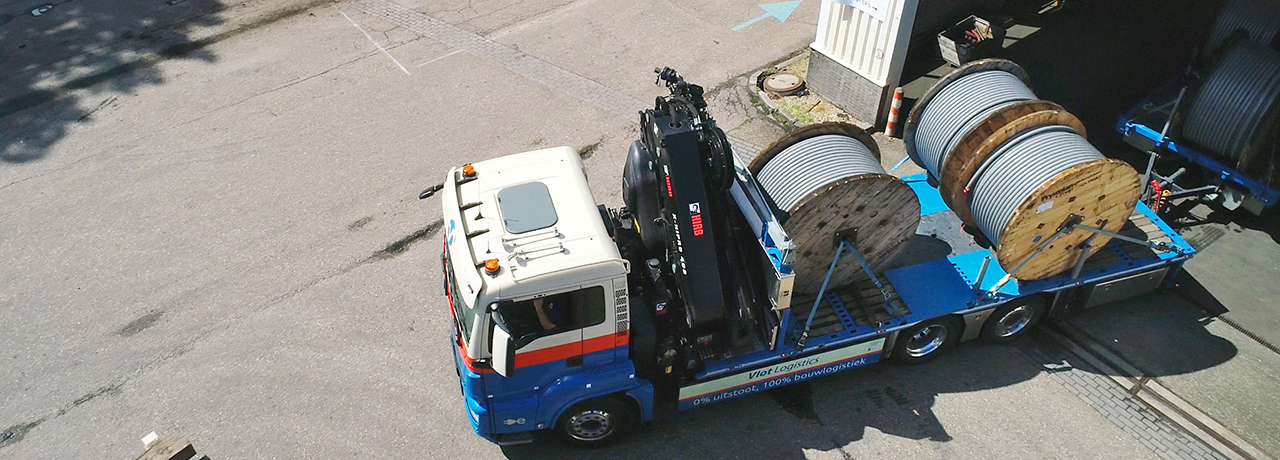Prysmian on the road to zero-emission road transport
First cable supplier with electric heavy transport.
------------------------------------------------------
Prysmian Netherlands’ road transport must be completely emission-free by 2050. To achieve this, it has started a pilot with electric heavy transport for tonnages of 20 to 25 tonnes. The results of the pilot, with which the Dutch branch is a global leader, are very promising for the organisation and the entire construction sector. The carbon dioxide emissions that Prysmian saves with its sustainable logistics will gradually increase to 900,000 kilos well-to-wheel per year.
Zero emissions in 2050 is a major ambition. Not only because Prysmian operates in a sector with high CO2 emissions (construction), but also because of its own CO2 emissions. On an annual basis, logistics service providers transport approximately 65,000 tonnes of goods for Prysmian Netherlands to customers, construction projects and distribution centres. This transport is carried out entirely with diesel trucks and is accompanied by carbon dioxide emissions of 900,000 kilos well-to-wheel. Reducing the environmental impact to zero is as ambitious as it is feasible, as an ongoing pilot shows.
World premiere
Last summer, Prysmian's first electric construction transport took place. Breytner B.V. transported eight full cable reels from the cable factory in Delft to the location of grid operator Stedin in Rotterdam. The trial delivery with the truck combination was the visible kick-off of a three-year pilot (2022-2024) with emission-free heavy transport. A unique operation for Prysmian and the sector. "As far as I know, we are the first cable supplier with electric drive for heavy transport," says Dennis Schuten, supply chain director of Prysmian Netherlands.
Hopeful
The pilot gives Schuten great hope. “It turns out that much more is possible with electric heavy transport than we initially thought. Operationally, the logistical processes are identical for us. So we can easily use it for more customers in the utility sector and in other market segments.” He is aware of the chain responsibility in construction logistics: “In order to make big steps, we want to collaborate with other chain partners. We are currently in talks with various customers and suppliers to continue the transition. In this way, we hope to add a number of leading projects to our pilot in the very short term.” In addition to imitation in the Dutch market, he also hopes to get the entire Prysmian organization on board.
Important precursor
According to Schuten, the motivation to achieve zero-emission transport is twofold. “Firstly, as Prysmian, we want to reduce our carbon footprint and achieve the SBTi target of zero emissions by 2050. We also want to be a pioneer in this, both in terms of implementation and performance.” The pilot is part of a corporate strategy with which Prysmian wants to reduce its emissions throughout the value chain, i.e. in products and production processes as well as transport. To this end, it supports the climate-scientifically substantiated objectives of the Science Based Targets initiative (SBTi). Prysmian Netherlands will soon publish a sustainability strategy for outbound logistics in which the results of the pilot are incorporated.
Great potential
That scaling up emission-free transportation will not happen by itself, Schuten realizes very well. "The charging infrastructure needs to be greatly expanded, just based on our cable deliveries in the Netherlands." He hopes this will happen soon. He is more optimistic about battery technology. "We have about 2,000 pounds less payload because of the battery. Moreover, the autonomous range is 150 kilometers for a single trip. But fortunately, battery technology is improving exponentially." He is now exploring other opportunities to electrify their transport activities. "In any case, there is great potential, because 50 percent of our deliveries from Delft take place within 150 km travel distance."
Other transport modes
Prysmian is not betting on one horse, by the way. "We are now working on electric transport, but emission-free transport includes more options, which we are also following. I think hydrogen is going to play a big role in heavy transport." However, waiting is not an option. "Another short term solution that we are researching is HVO diesel. Before starting the deployment of HVO diesel, we want to finish our research on possible implications for longer term.” Eventually I expect fuel prices to move closer and closer in favor of electric, or even hydrogen." Then emissions-free transport will become the new normal; the convoy will be unstoppable.



